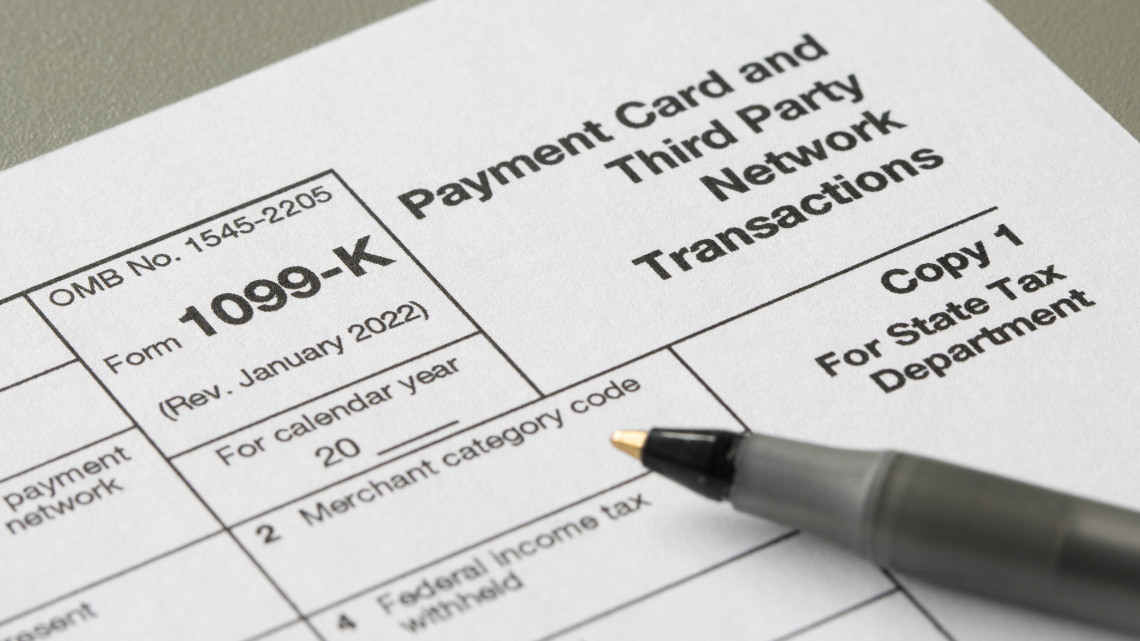
Because increasingly more people are turning to the online platform economy for work, the IRS updated the rules for Form 1099-K, Payment Card and Third Party Network Transactions, to ensure that more taxpayers are reporting all of their taxable income.
Form 1099-K is an IRS information return that third-party payment networks such as credit card companies, payment apps such as Venmo or PayPal, and online marketplaces use to report certain payment transactions for goods and services from online platforms. They must also send a copy of the form to taxpayers by January 31.
Earlier this year, the IRS announced plans to sharply decrease the reporting threshold for the 2023 tax year to anyone making more than $600, regardless of the number of transactions. Yet, that requirement has now been delayed.
- Recently, the IRS announced that the 2023 tax year will be instead regarded as a transition period, with no change to the reporting threshold. Taxpayers will continue to receive 1099-Ks only if their payments from third-party payment platforms or electronic transactions total more than $20,000 and more than 200 transactions for goods or services.
- As of now, the IRS plans to begin implementing the lower reporting thresholds by decreasing the threshold to $5,000 beginning with the 2024 calendar year.
The delay in implementing the decreased reporting threshold gives the IRS additional time to implement the new reporting requirements and make updates to Form 1040 and related schedules for 2024, making the reporting process easier for taxpayers.
Following are some frequently asked questions about Form 1099-K.
What’s the difference between a Form 1099-K, Form 1099-NEC and Form 1099-MISC?
- Form 1099-NEC reports compensation payments of $600 or more for services provided to someone who isn’t an employee.
- Form 1099-MISC reports other types of income, such as rents, royalties, prizes or awards paid to third parties.
- Form 1099-K reports payment card and third-party network transactions. This form will come from the payment settlement entity rather than the business or person paying for the goods/services.
Businesses and individuals must keep careful records to determine how the payments should be reported and ensure that transactions are not duplicated. Also, businesses should carefully consider the classification of someone as a non-employee versus an employee.
What happens if I receive a Form 1099-K in error (such as for a personal reimbursement for an expense)?
Contact the issuer of the Form 1099-K to determine if they will issue a corrected form. If they are unable to issue a corrected form, the IRS recommends reporting the information as follows:
- Part I – Line 8z – Other Income: Form 1099-K Received in Error
- Part II – Line 24z – Other Adjustments: Form 1099-K Received in Error
The net effect of these two adjustments on adjusted gross income would be zero.
What should I do if I receive a Form 1099-K in my name and it should have been reported to my business?
Contact the Payment Settlement Entity listed on the Form 1099-K to request a corrected form showing the business’s TIN. For tax return purposes, report the income from the Form 1099-K on the appropriate business return. Maintain documentation of the correspondence for your files.
How do I prevent personal transactions from being reported to me on Form 1099-K?
PayPal and Venmo offer the option to tag their transactions as either personal/friends and family or goods and services by choosing the appropriate category for each transaction. Note that if you are selling a personal item, such as concert tickets, this should be considered a goods/services transaction.
A best practice would be to create a separate personal and business profile/account within the third-party platform to keep business transactions separate from nontaxable personal transactions.
I sold personal items (such as household goods) during the year and received payment using a third-party settlement organization. How should this be reported on my tax return?
You should first determine whether the items were sold for a gain or a loss (generally, sales price less acquisition cost). You cannot offset the gain on the sale of personal assets with losses from the sale of personal assets. See Publication 525, Taxable and Nontaxable Income, for further guidance.
If you sell an item you owned for personal use at a gain, the gain is taxable as a capital gain (regardless of whether it was reported on a 1099-K).
If you sell a personal item at a loss and you receive a 1099-K, report this transaction as follows:
- Part I – Line 8z – Other Income – Form 1099-K Personal Item Sold at a Loss
- Part Il – Line 24z – Other Adjustments – Form 1099-K Personal Item Sold at a Loss
The net effect of these two adjustments on adjusted gross income would be zero.
I have a crafting hobby and sell my products on Etsy. I received a Form 1099-K. How should this be reported?
There can be complicated rules around whether an activity is a hobby or a business for tax purposes. If the activity is considered a hobby, the income should be reported (regardless of whether it is reported on a Form 1099-K or another form), and the expenses are not allowed.
Summary
For the 2023 tax year, the threshold remains unchanged. Taxpayers will receive 1099-Ks only if their payments from third-party payment platforms or electronic transactions total more than $20,000 and more than 200 transactions for goods or services.
As of now, the reporting threshold for the 2024 calendar year will decrease to $5,000 as part of a phase-in implementation.
The tax law has not changed regarding the reporting of income. The changes to Form 1099-K and information reporting are meant to increase voluntary tax compliance. Find further guidance on the IRS web pages, 2023 Form 1099-K Reporting Threshold Delay and Understanding Your Form 1099-K.
Article courtesy of Yeo & Yeo
Click here for more News & Resources.